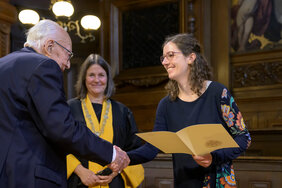Each year the Klaus-Georg and Sigrid Hengstberger Award enables up to three young scientists at Heidelberg University to organize their own dedicated symposium. This year, Dr. Mélanie Chevance, Emmy Noether Junior Research Group Leader at the Institute for Theoretical Astrophysics (ITA) of the Center for Astronomy of Heidelberg University (ZAH), is one of the awardees. The award has a value of 12.500 Euro and will support Dr. Chevance in organising a scientific symposium at the Heidelberg International Science Forum (IWH) on "The Feedback-Driven Matter Cycle in Galaxies: new perspectives from JWST" from June 3-7, 2024.
Dr. Mélanie Chevance aims to quantify how matter flows within galaxies, how gas is converted into stars and how stars eject the material again into the surrounding medium, the so called matter cycle. The physical processes that drive this cycle take place on the small scale of molecular clouds, but govern the evolution of entire galaxies. In turn, the large-scale structure of galaxies shape the environmental conditions in which stars form. “The matter cycle is some kind of engine that drives the development of galaxies. However, its complexity also makes it one of the main unknowns in modern astrophysics, and the main uncertainty in simulations of galaxy formation and evolution," explains Dr. Chevance. Her research group combines observations with numerical modelling and aim to improve computer-supported galaxy simulations so that they faithfully reflect the characteristics of the actual universe. The unprecedented observing capabilities of the new James Webb Space Telescope (JWST) shed a new light on this matter cycle in galaxies and allow to study the effects of stellar feedback in more detail than ever before, from the heating of the gas and dust by the youngest stars, to the dispersal of the parent gas cloud by the radiation and winds of massive stars, and ultimately to the giant gas shells blown out by supernova explosions. The first observations demonstrate that we are now able to observe these signatures of feedback in a wide range of environments, from nearby star-forming regions to distant galaxies. The first JWST observations are already in hand, its capabilities are now well understood, and five years are left to acquire new observations with this revolutionary telescope.
In her Hengstberger Symposium, planned for June 3-7, 2024, Dr. Chevance and her group will bring together world-leading experts from several fields in astrophysics, with expertise in simulations, observations and theory, to discuss the recent advances in our understanding of feedback and identify the directions in which progress with JWST should be prioritised.
Mélanie Chevance received her Master’s degree in astronomy and astrophysics in 2013 from the Pierre and Marie Curie University and the Paris Observatory (France). In 2016 she obtained a PhD at the Paris Diderot University and the research centre of the French Alternative Energies and Atomic Energy Commission (CEA) in Saclay. Since May 2022 she has carried out her research at the Institute of Theoretical Astrophysics where she also started her Emmy Noether research group in May 2023.
Dr. Chevance formally received the Klaus-Georg and Sigrid Hengstberger Award from Prof. Dr. Frauke Melchior, Rector of Heidelberg University, during the university's annual celebration on October 21, 2023.
BACKGROUND INFORMATION
- Since 2004, up to three Klaus-Georg and Sigrid Hengstberger awards are annually granted to young scientists and researchers of the Ruprecht-Karls-Universität Heidelberg. The awards are intended to enable the awardees organize a scientific symposium “The Ruperto Carola Symposium at the IWH: A Sponsorship Award for Young Scientists.” A sum of 12.500 Euros is awarded to each of the three selected projects. The award is aimed at scientists, researchers or scholars working in any academic discipline, be it natural sciences and medicine or humanities and social sciences. The award ceremony for the Klaus-Georg and Sigrid Hengstberger Award takes place during the anniversary celebrations ("Jahresfeier") of the Ruprecht-Karls-University.
- The International Academic Forum Heidelberg (IWR) is an interdisciplinary centre for scholarly exchange in academia. As a vital organ and think tank of the Heidelberg University it has been providing a platform for multidisciplinary intellectual engagement for over three decades. Since its inauguration on April 12th 1986, more than 2000 symposiums, workshops, seminars and conferences have convened at the International Academic Forum. The IWH is a research facility of Heidelberg University. For more information see www.uni-heidelberg.de/einrichtungen/iwh/index_engl.html.

